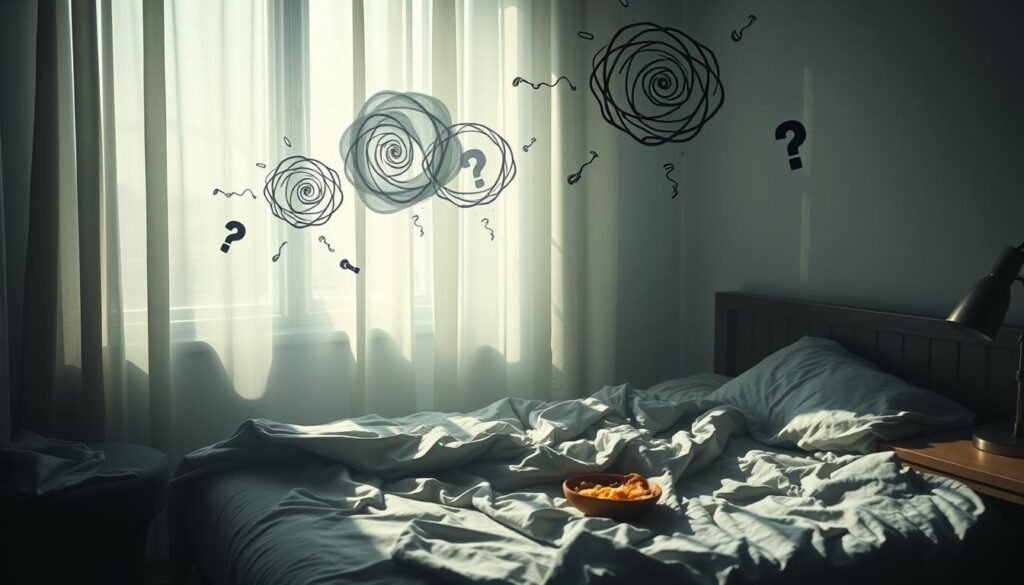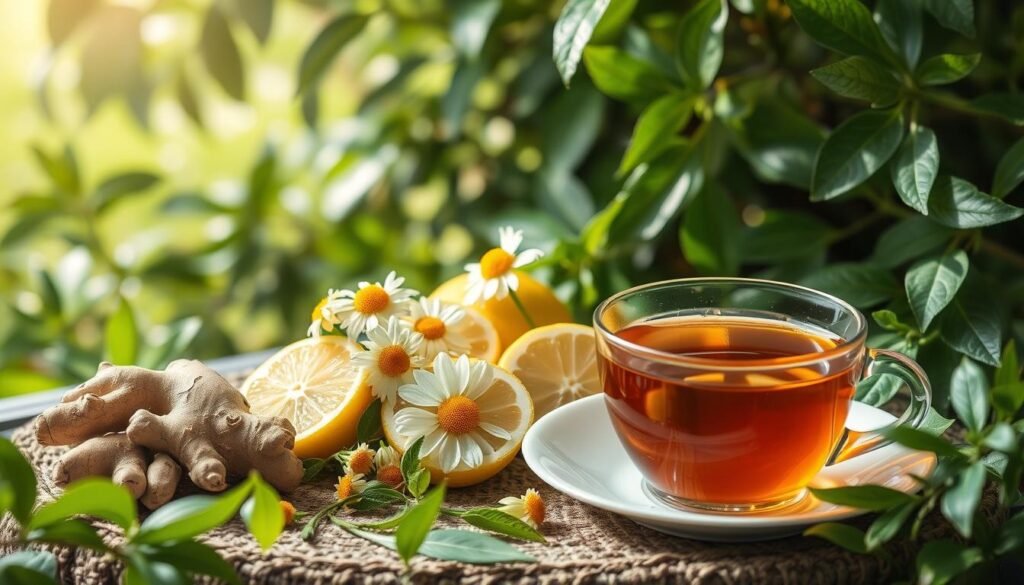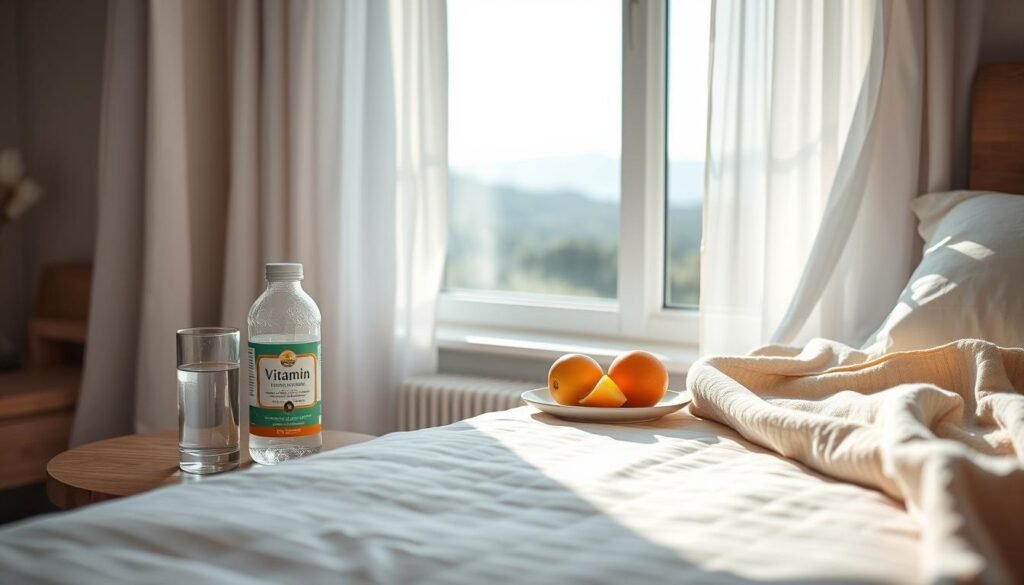Did you know about 22% of people under 30 feel hangxiety after drinking? It’s not just a brief unease. It comes from how alcohol, anxiety, and physical discomfort mix and can last for days. As many young adults drink socially, they face this tough reality. It’s key to understand this to handle hangover anxiety well.
Managing mood changes from neurotransmitter disruption is vital. Also, knowing hangover relief remedies are more than just for headaches is crucial. Hangover anxiety can begin 6 to 20 hours after drinking. This can lead to ongoing distress that hurts daily life. Without proper treatment, this can turn into long-term anxiety. Thus, it’s important to include effective treatments for morning-after anxiety in your care routine.
Next, we’ll look at different ways to find quick relief, natural cures, and whole-body methods. Plus, we’ll cover how to avoid hangxiety before it starts. These tips will help you find calmness after enjoying a night out.
Key Takeaways
- Hangxiety impacts about 22% of young people after they drink.
- Symptoms can linger for 6 to 20 hours after drinking.
- Alcohol messes with neurotransmitters, affecting mood and anxiety.
- Good management includes drinking water and taking care of yourself.
- To prevent hangxiety, know how much alcohol you can handle.
Understanding Hangover Anxiety: What is Hangxiety?
Hangover anxiety, or hangxiety, happens when hangover meets intense anxiety after drinking. The term shows the mix of physical and mental stress. When alcohol fades away, anxiety often hits harder than before. This is notable after social drinking.
Drinking affects brain chemicals, causing unease. Around 20% of anxious individuals may use alcohol to feel better. However, this can worsen anxiety later, leading to a harmful cycle. Thus, seeking alcohol-related anxiety treatment becomes crucial.
Alcohol’s effect on mental health is serious. It can raise anxiety by changing cortisol, a stress hormone. This effect is stronger in women. For regular drinkers, hangxiety might last more than a day. Recognizing the link between anxiety and heavy drinking is key for those at risk.
Learning to handle hangxiety is essential. Things like staying hydrated and moderate drinking help lessen symptoms. For more tips, visiting this link can offer helpful insights on managing hangxiety effectively.
Causes of Hangover Anxiety
The causes of hangover anxiety are complex. They involve social, emotional, and physical factors. Social anxiety and drinking can mix in tricky ways.
People might drink to feel better in social spots. This can work for a while, but negative feelings often come back after. When the buzz from alcohol fades, unease and fear may grow.
The body’s detox process can cause mood swings and irritability. Losing key neurotransmitters after lots of drinking can mess with your mood. A big drop in endorphins can make you feel even worse.
Physical issues are also key. Not having enough water and certain nutrients, like folic acid, can make anxiety worse. Alcohol affects the brain by messing with its “feel-good” chemicals.
Drinking too much can trap you in a cycle of needing more alcohol. This can make anxiety spike the next day.
Seeing how these factors link up can help handle hangover anxiety. Trying out alcohol-free options can be a smart move. It can help you enjoy social settings without anxiety taking over.
https://www.youtube.com/watch?v=_WBx6CPAjTQ
| Factors | Effects on Hangover Anxiety |
|---|---|
| Social Anxiety | Increases reliance on alcohol as a coping mechanism |
| Emotional Withdrawal | Can cause mood swings and increased sensitivity |
| Dehydration | Affects physical well-being, leading to heightened anxiety |
| Poor Nutrition | Can worsen anxiety symptoms post-drinking |
| Exhaustion | Contributes to increased feelings of dread and paranoia |
Physical Symptoms of Hangover Anxiety
Hangover anxiety shows through physical symptoms that make one feel really uncomfortable. You might have a headache, feel nauseous, or be extremely tired. These problems often come from not drinking enough water and feeling anxious, which makes you feel even more restless and upset.
After drinking, you might not sleep well, which makes the physical symptoms worse. You could feel dizzy and have sore muscles, adding to your discomfort. If your heart starts beating fast, it could make your anxiety worse during this tough time.
It’s important to know how hangover symptoms and anxiety are linked. A study showed that about 22.6% of people feel anxious when they have a hangover. The lack of water in your body and feeling anxious can make you more tired and your stomach more upset. This can make the whole situation feel awful.
People who often feel anxious might find that these symptoms last for hours, even after their blood alcohol level is back to normal. To manage these feelings, it’s helpful to know what the symptoms are and what steps to take. Drinking water and staying away from things like caffeine can help make you feel better.
Psychological Symptoms of Hangover Anxiety
Hangover anxiety can make you feel overwhelmed. It can trap you in worry, regret, and panic. About 12% of people with hangovers feel this way. This is known as “hangxiety.” Drinking alcohol can mess with your mood. It’s important to know how this can make anxiety worse after drinking.
When you drink, you first feel good because of dopamine and endorphins. But then, you may feel a big low. This increases alcohol-related anxiety. Your brain reacts to alcohol’s presence and then its absence. This can make you feel guilt, shame, and unease. Many people start thinking about their drinking and behavior. This makes their anxiety worse.

Poor sleep often follows a night of heavy drinking. If you partied the night before, you might wake up tired and moody. This can make anxiety worse. Cortisol, the stress hormone, also goes up when you drink and after. This can make you feel even more nervous.
- Cognitive dissonance and self-recrimination after drinking can amplify anxiety.
- Heavy drinking can disrupt sleep, leading to daytime fatigue and increased anxiety.
- Individuals with pre-existing anxiety disorders may find their feelings exacerbated post-drinking.
- Avoidance behavior may develop, steering individuals away from alcohol to mitigate anxiety.
If you often feel hangxiety, trying mindfulness and stress management might help. Joining online groups for support is also good. Understanding what triggers your hangover anxiety and getting help is key to coping in a healthier way.
| Symptom | Description |
|---|---|
| Feelings of Guilt | Individuals may reflect on past drinking behavior, leading to regret and anxiety. |
| Increased Worry | Concerns about social interactions and perceptions from others can heighten anxiety. |
| Panic Attacks | Episodes of intense fear can occur, especially for those with social anxiety. |
| Difficulty Concentrating | Hangover anxiety can interfere with focus and cognitive function. |
Hangover Anxiety Cure: Quick Relief Strategies
Facing hangover anxiety means using smart, quick relief methods. Focus on two main areas: hydration and eating right. These steps can make a big difference for anyone feeling anxious after drinking. They help with both the mind and body effects of hangover anxiety.
Hydration is Key
Keeping hydrated is very important when dealing with hangover anxiety. Not drinking enough water makes anxiety worse. Drinking water and drinks full of electrolytes helps replace fluids you’ve lost. Good options include:
- Coconut water
- Sports drinks
- Broth-based soups
Drinking these helps you get important minerals and nutrients back. Make sure to keep drinking water all day, especially if you drank alcohol the night before.
Nourishing Your Body
Eating well is also crucial for getting over a hangover. Choosing the right foods can make you feel better and ease hangover signs. Some easy-to-eat options are:
| Food | Benefits |
|---|---|
| Bananas | Rich in potassium, helps reduce fatigue and restore electrolyte balance. |
| Oatmeal | Provides fiber and stabilizes blood sugar levels, promoting energy. |
| Toast | Easy to digest; helps absorb alcohol remnants in the system. |
| Eggs | High in protein and amino acids, supporting brain health and stability. |
Using these hangover relief remedies makes sure your body gets what it needs to recover. Eating nourishing foods also helps lessen anxiety. To learn more about easing hangxiety, check out this helpful resource.
Natural Cures for Hangover Anxiety
Looking into natural cures for hangover anxiety can help people find good alternatives to drugs. Many herbal treatments and essential oils work well to ease hangover anxiety. These methods use a complete approach, helping both the mind and body heal.
Herbal Remedies
Many plants have calming effects that can ease anxiety. Two standout herbs are:
- Ginger: It battles nausea and can ease stomach problems tied to hangover anxiety.
- Chamomile: This herb helps calm you down and lowers stress and tension.
| Herb | Benefits | How to Use |
|---|---|---|
| Ginger | Anti-nausea, calming | Tea, supplements, or fresh root |
| Chamomile | Relaxation, anti-anxiety | Tea or essential oil inhalation |
Essential Oils for Relaxation
Using essential oil benefits creates a relaxing environment. Essential oils help greatly with hangover anxiety via aromatherapy. Two great choices are:
- Lavender: Known for relaxing effects, it lessens stress and helps with sleep.
- Peppermint: Its lively smell aids in headache relief and restores mental sharpness, which is helpful after a night out.

Adding these natural solutions can offer both emotional and physical relief. It makes recovery smoother. By using herbal remedies and essential oils, facing hangover anxiety becomes easier and more comfortable.
Holistic Approaches to Managing Hangover Anxiety
Finding ways to deal with hangover anxiety involves holistic practices. These aim to balance and improve well-being. Meditation and breathing exercises are key for reducing anxiety. They help bring calmness by improving how you breathe. This is very helpful after drinking too much.
Meditation and Mindfulness
Meditation is a top method for battling hangover anxiety. It helps you focus and distance yourself from stress. This leads to relaxation and better emotion handling. If you meditate often, you’ll find your anxiety might lower and you’ll feel calmer day-to-day.
Breathing Exercises for Calm
Simple breathing exercises can help right away. The 4-7-8 method is one where you breathe in for four seconds, hold it for seven, then out for eight. This helps calm you by changing how you breathe, lowering stress. Doing these exercises daily helps manage emotions, especially after drinking.
| Technique | Description | Benefits |
|---|---|---|
| Meditation | A practice that encourages focused awareness and mindfulness. | Reduction in anxiety, improved emotional health, greater peace. |
| 4-7-8 Breathing | A structured breathing technique that promotes relaxation. | Calmness during anxiety, immediate stress relief, enhanced focus. |
| Mindfulness | Staying present with thoughts and feelings without judgment. | Improved self-awareness, emotional regulation, reduction of anxious feelings. |
Hangover Anxiety Prevention Tips
To prevent hangover anxiety, it’s smart to drink responsibly and make some lifestyle changes. Being proactive helps lessen the chances of feeling bad later.

- Establish drink limits before social gatherings. Setting clear limits can help maintain control and allow for a more enjoyable experience.
- Moderation strategies are essential. Consider opting for non-alcoholic beverages or alternating alcoholic drinks with water to stay hydrated.
- Consume a nutritious meal prior to drinking. Eating can help mitigate the adverse effects of alcohol.
- Stay hydrated during and after drinking sessions. Drinking water can support recovery and reduce hangover symptoms.
- Engage in mindfulness techniques to create awareness about personal drinking habits. Understanding one’s limits is crucial for responsible drinking.
Understanding moderation strategies makes drinking more enjoyable. Many people don’t like the non-alcoholic options pubs offer. A survey found that 74% were unhappy, but 89% still value these choices.
Visiting places with good non-alcoholic selections often leads to greater satisfaction. Spending time with friends and family helps control drinking. Hence, choosing wisely about alcohol is about putting your health first.
| Tip | Description |
|---|---|
| Set Limits | Define personal drink limits prior to events for better control. |
| Hydration | Alternate water with alcoholic beverages to remain well-hydrated. |
| Nutritious Meals | Eating ahead of drinking can lower the risk of adverse effects. |
| Mindfulness | Practice awareness about drinking habits to promote responsible choices. |
| Social Connections | Engage with loved ones to encourage healthy drinking practices. |
By taking proactive steps, you can enjoy a healthier relationship with alcohol. This significantly cuts down the risk of hangover anxiety. Simple changes now can make future drinking more enjoyable and stress-free.
Post-Drinking Anxiety Solutions
After a night out drinking, people often feel a mix of shame and regret. This is usually called “hangxiety.” It can lead to more anxiety and sometimes depression. It’s important to know how to deal with this to get better.
Doing things that help you relax is key after drinking. Sleeping enough helps your body get back to normal. Light exercises, like stretching or walking, can make you feel happier by releasing endorphins. Practices like deep breaths or meditation also reduce anxiety and depression.
Talking to friends or family is helpful when you feel anxious after drinking. Doing things you enjoy, like watching movies or listening to music, takes your mind off worries. It’s crucial not to drink more alcohol, as it only makes anxiety worse.
To handle anxiety well, set limits on your drinking. Try to drink slower at events. Mixing in non-alcoholic drinks and eating healthy snacks also helps. These steps can decrease anxiety and make hangxiety less intense.
If your anxiety is really strong, you might need to see a professional. Support services are there to help. Taking care of your mental health should be done in many ways for the best results.
| Technique | Description | Benefits |
|---|---|---|
| Rest | Ensuring adequate sleep after drinking | Aids recovery and stabilizes mood |
| Physical Activity | Engaging in light exercises, like walking | Releases endorphins, reduces stress |
| Relaxation Techniques | Practicing deep breathing or meditation | Alleviates anxiety and depression symptoms |
| Social Support | Connecting with friends or loved ones | Provides emotional comfort and understanding |
| Professional Help | Seeking guidance for severe anxiety or AUD | Tailored support and strategies for recovery |
Conclusion
Understanding hangover anxiety is key. It’s about knowing how drinking affects your mind. This article covered ways to ease hangovers. We talked about staying hydrated, eating right, and calming the mind. Techniques like yoga and meditation can also help. Knowing how your body responds to hangovers is the first step to better manage them.
Hangxiety might be a sign you’re drinking too much. It shows the need for drinking responsibly. If you find yourself struggling, it’s okay to seek help. Places like Banyan Palm Springs offer support. They look into why you drink and its impact on your mind. For tips on handling hangover anxiety, check the details here.
Being aware and using these strategies can improve your relationship with alcohol. It leads to a happier, more stable life. This doesn’t just make you feel better. It makes the people around you happier too.